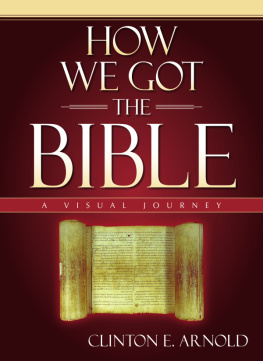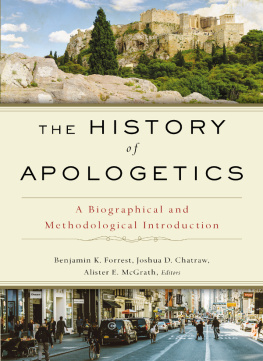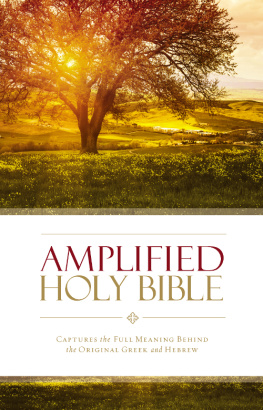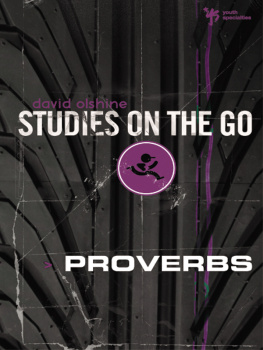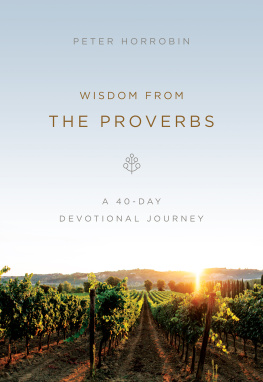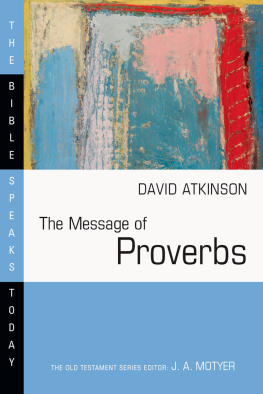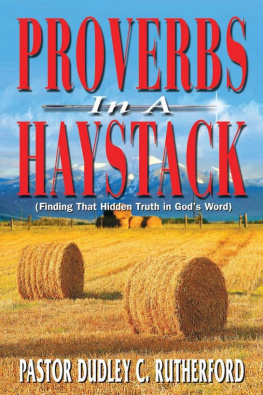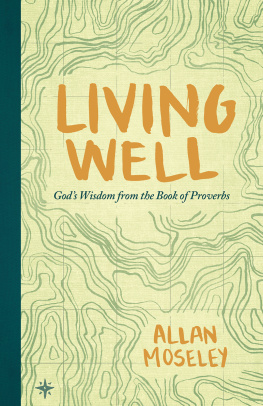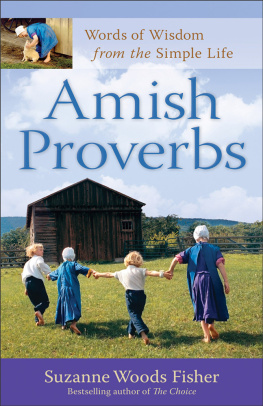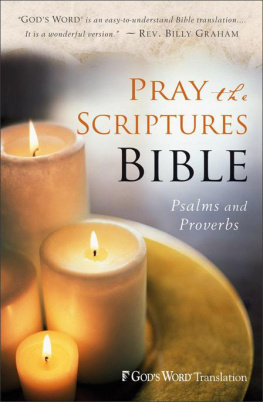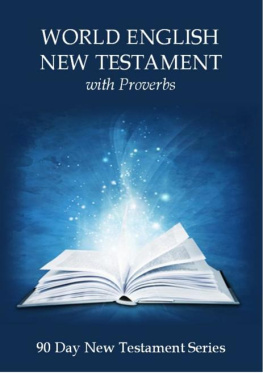ZONDERVAN
10 Minutes in the Word: Proverbs
Copyright 2018 Zondervan
Requests for information should be addressed to:
Zondervan, 3900 Sparks Dr. SE, Grand Rapids, Michigan 49546
ePub Edition March 2018: ISBN 978-0-310-09255-1
Library of Congress Cataloging-in-Publication Data
ISBN 978-0-310-09194-3
Scripture quotations are taken from the Holy Bible, New International Version, NIV. Copyright 1973, 1978, 1984, 2011 by Biblica, Inc. Used by permission of Zondervan. All rights reserved worldwide. www.zondervan.com. The NIV and New International Version are trademarks registered in the United States Patent and Trademark Office by Biblica, Inc.
Any Internet addresses (websites, blogs, etc.) and telephone numbers in this book are offered as a resource. They are not intended in any way to be or imply an endorsement by Zondervan, nor does Zondervan vouch for the content of these sites and numbers for the life of this book.
All rights reserved. No part of this publication may be reproduced, stored in a retrieval system, or transmitted in any form or by any meanselectronic, mechanical, photocopy, recording, or any otherexcept for brief quotations in printed reviews, without the prior permission of the publisher.
Art direction: Kathy Mitchell
Interior design: Kristy Edwards
18 19 20 21 22 TIMS 10 9 8 7 6 5 4 3 2 1
Information about External Hyperlinks in this ebook
Please note that footnotes in this ebook may contain hyperlinks to external websites as part of bibliographic citations. These hyperlinks have not been activated by the publisher, who cannot verify the accuracy of these links beyond the date of publication.
T he book of Proverbs belongs to a category of Scripture that theologians refer to as the wisdom literature of the Old Testament. The purpose of the book is to help readers acquire and apply Gods wisdom to daily living. In Proverbs, the words wise and wisdom appear at least 125 times.
The truths found in Proverbs address several areas of life, including enjoying healthy relationships, handling money, avoiding trouble, dealing with temptation, managing our feelings, exercising self-control over our speech, maintaining a happy home, and building godly character. While all of us want to succeed in these areas, and none of us want to be foolish, because of our sin nature we struggle in making good decisions. The book of Proverbs teaches us how to become wise in daily living as we experience a relationship with Jesus Christ. Only when our relationship with God is restored through Christ can we live wisely.
The fear of the L ORD is the beginning of knowledge, but fools despise wisdom and instruction.
Proverbs 1:7
T he book of Proverbs doesnt waste any time stating its purpose. The opening verses reveal the goal is for gaining wisdom and instruction. The Hebrew word for wisdom is hokmah and is defined as skill or expertise in living. On any given day, there are countless opportunities to make either wise or foolish decisions. Wisdom is the ability to survey a situation and make the right choice. According to Solomon, a wise person makes a habit of listening and learning. When it comes to wisdom, there are always new things to learn. A wise person understands wisdom is not a destination where someone arrives but is a lifelong pursuit.
Possessing biblical wisdom isnt limited to people with high IQs and lofty degrees. Solomon revealed its for those who are simple and young and are therefore nave and untaught (v. 4), as well as those who are wise and discerning (v. 5). All people have the opportunity to grow in wisdom, instruction, and understanding.
While its true most of us want to excel in every area of life, due to our sin nature, we lack the ability to make wise decisions. When a person attempts to be wise by drawing on his own resources, the best wisdom he can produce is earthly, unspiritual, demonic (James 3:15). Fools despise wisdom and instruction. Foolishness is doing what is right in your own eyes. Wisdom is doing things Gods way.
You might be wondering, How do I get wisdom? Solomon instructed, The fear of the L ORD is the beginning of wisdom (Proverbs 9:10). The phrase fear of the L ORD is found fourteen times in Proverbs. In this context, the fear of the L ORD doesnt mean being afraid of God. It means to esteem God above all things. Revering God above everything else is the first step in acquiring wisdom. This means there is no division between the sacred and secular parts of life, but rather, God governs every aspect of living. Practically speaking, when someone fears the Lord it means his relationship with God impacts every decision, and there is a desire to do things Gods way. Wise living means relying on God rather than yourself (Proverbs 3:56).
Lord, help me understand that wisdom is a result of my relationship with You. Give me a heart and mind that revere You above all things. Empower me to prioritize my life in such a way that nothing comes before You. I ask You to increase my wisdom (James 1:5). Father, I also ask that You will give me a spirit of wisdom and revelation in the knowledge of You (Ephesians 1:1718) and that I will increase in wisdom all the days of my life.
Do you long for the instruction of the Lord? Do you think you are always right, or are you open to correction? Is wisdom something you are willing to request from God? Acquiring wisdom is a worthy pursuit, but it takes time. The proverbs teach that wisdom cannot be attained apart from reverence for God. It is in Jesus Christ, in whom are hidden all the treasures of wisdom and knowledge (Colossians 2:3).
Listen, my son, to your fathers instruction and do not forsake your mothers teaching.
They are a garland to grace your head and a chain to adorn your neck.
Proverbs 1:89
I ts no mistake that as Solomon introduced the topic of wisdom to his audience, one of the first commands he issued was to listen. Weve all known someone who was convinced he knew best and spurned the counsel of the wise. But no one will grow in wisdom without developing the skill of listening. Proverbs repeatedly issues the call to listen (4:1, 10, 20; 5:1, 7; 7:24; 8:32; 19:20; 22:17; 23:19, 22).
The first people we usually learn to take instruction from are our parents. But no amount of parental wisdom will help a child if he or she refuses to listen. Later in life, we have the opportunity to learn from teachers, coaches, pastors, bosses, and mentors. But our listening skills or lack of them will follow us to each relationship. The sooner we develop the ability to be a good listener, the better.
Solomon asserted that those who listen to instruction and apply wise teaching will be blessed. He wrote, They are a garland to grace your head and a chain to adorn your neck (v. 9). In Solomons era, the garland and chain served as symbols of honor, guidance, and protection. While its true that none of us are promised a life free from struggles, those who choose to live wisely will avoid an enormous amount of trouble that routinely plagues those who live foolishly.
As we grow in wisdom and learn to listen well, we will be able to discern between wise counsel and bad advice. Not all the counsel we receive is biblically sound or even a good idea. Good listeners learn things that others dont. A former talk-show host once said, I never learned anything while I was talking. Each day we have an opportunity to learn from other people. In fact, we can even learn from foolish people. As we watch and listen to foolish people speak, we can learn what to avoid. And, of course, as we watch and listen to the wise we can learn how to live well. A key component in becoming a good listener is admitting we still have things to learn. If we arrive at the false conclusion that we already know it all, we will talk more than we listen and never grow in wisdom.



